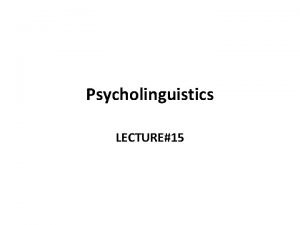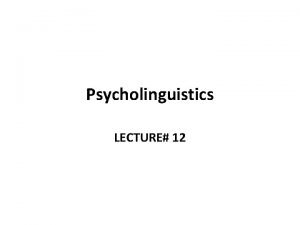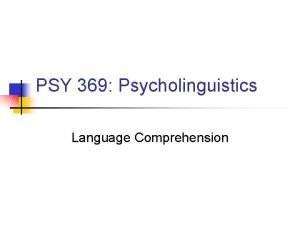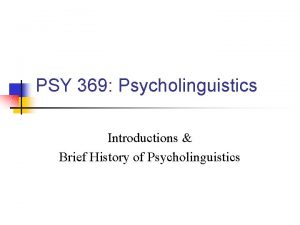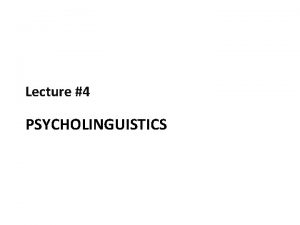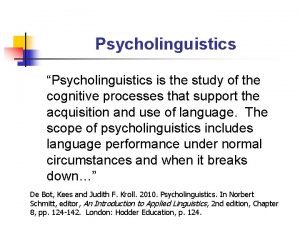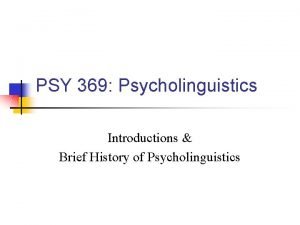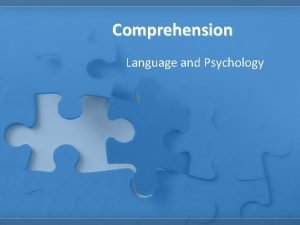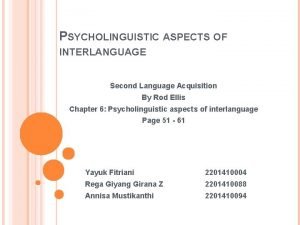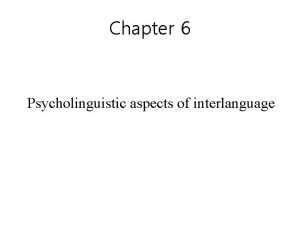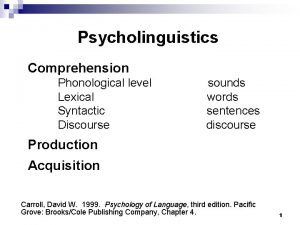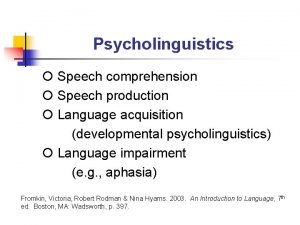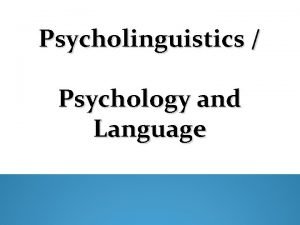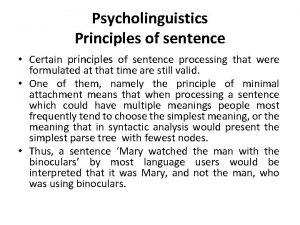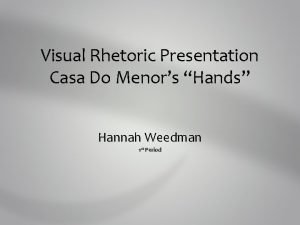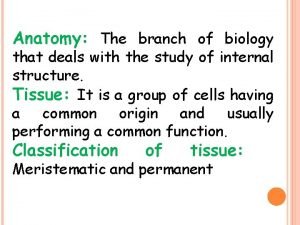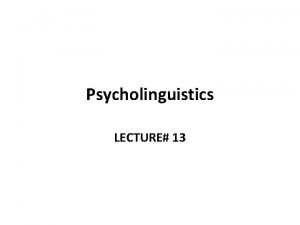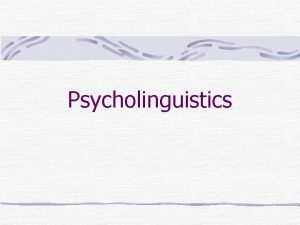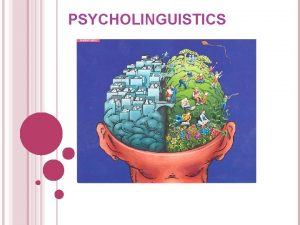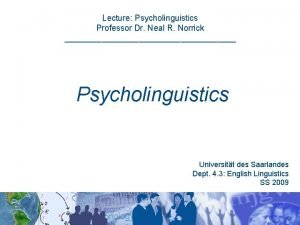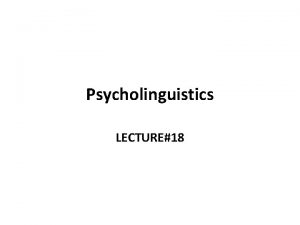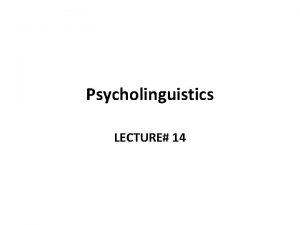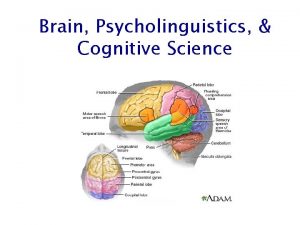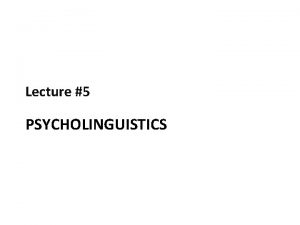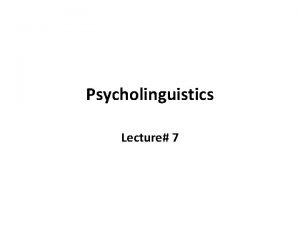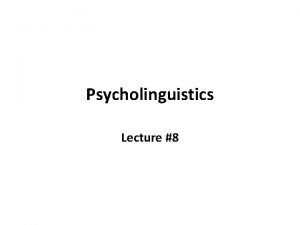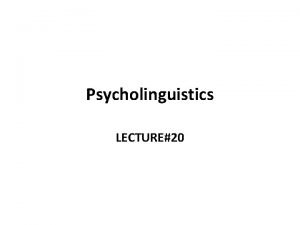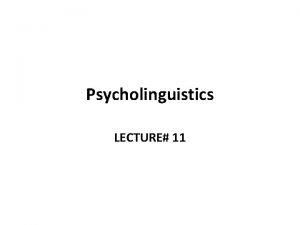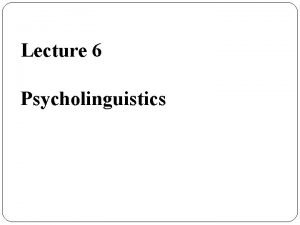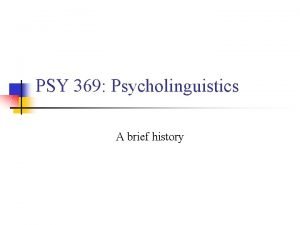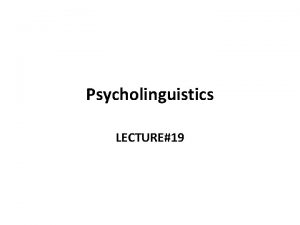Psycholinguistics Principles of sentence Certain principles of sentence



























- Slides: 27

Psycholinguistics Principles of sentence • Certain principles of sentence processing that were formulated at that time are still valid. • One of them, namely the principle of minimal attachment means that when processing a sentence which could have multiple meanings people most frequently tend to choose the simplest meaning, or the meaning that in syntactic analysis would present the simplest parse tree with fewest nodes. • Thus, a sentence ‘Mary watched the man with the binoculars’ by most language users would be interpreted that it was Mary, and not the man, who was using binoculars.

Psycholinguistics • One other principle worth noting is the principle of late closure which states that there is a tendency to join a new information to the current phrase, or clause. • which explains why in a sentence such as ‘john said he will leave this morning the phrase ’this morning’ would be understood as relating to the verb ‘leave’ and not to the word ‘said’.

Psycholinguistics Processing of texts • Other psycholinguistic investigations into how processing of texts occurs led to conclusion that complex sentences with multiple clauses are interpreted faster and with less mental effort when the clauses are not reduced. • When it comes to speech the experiments show that the interpretation of sentences can vary depending on the placing of pauses, or disfluencies. • Additionally, it has been proven that visual contact between speakers also has a strong influence on the ease, or difficulty of processing text.

Psycholinguistics • During experiments subjects were listening to some sentences and those who saw the speaker could understand what the speech was about better, while those who did not see him often had difficulties with it. • The recent tendencies in psycholinguistics show increasing interest in discourse processing, and in particular in the way readers create a mental representation of the narrative word. • The focus of interest is on the role of readers’ schemata (plan or scheme) and the problem of inferences (conclusion or deduction) about the read subject matter.

Psycholinguistics • It has been proved that certain inferences are made in the very process of reading, while others are made later in order to resolve some problems or inconsistencies. • The issue of background knowledge and automaticity of drawing inferences are still being investigated.

Psycholinguistics • The ideas of psycholinguistic interest flourished primarily in Europe in the early 1960 s and then in America in 1987. • The first overview of psycholinguistics appeared in ‘Annual Review of Psychology’ by Rubenstein and Abron in 1960. • In 1964, George A. Miller, through his writings and experiments, bridged the gap between linguistic theory and psychological experimentation. • In 1964, it was completely accepted by M. Neill.

Psycholinguistics • In the early stage, psycholinguistics covered an extremely broad area, from acoustic phonetics to language pathology. • But gradually, it converged to a certain area of language and linguistic theory. • Now, psycholinguistics is confined to the interrelationship of psychological and linguistic behaviour. • It studies how the mind processes and produces language

Psycholinguistics • It uses linguistic concepts to describe the mental processes connected with the acquisition and use of languages. • Psycholinguistics deals with the various aspects of meaning. • It has been deeply influenced by the development of generative theory, and its most important area of investigation has been language acquisition.

Psycholinguistics • The relation between psychology and language cannot be ignored. Linguistic science is directly connected with the mind and psychological behaviour. • The linguistic expression of a man depends, many times on the mental states such as love, anger, hatred, surprise, distress– all have a deep impact on the language. • Sometimes, the language, especially speech, loses its control, which means the mental state is expressed through it.

Psycholinguistics • Particularly, semantics is totally dependant on psychology. • Psychology also assists in forming the syntax of a language. • On some occasions, to know the reason for phonological changes, we have to take the help of psychology. • The origin and growth of a language is also the direct or indirect areas of psychology. • It also studies child psychology of mentally retarded people. The psychological treatment of the mentally diseased also depends on the specific type of speech.

Psycholinguistics • Language is a mental phenomenon. Whatever we think is expressed in language behaviour. • Psycholinguistics studies these mental processes, such as thought and concept formation. • The concept of psycholinguistics was developed in the early sixties. • In the beginning it had covered a very broad area, from acoustic phonetics to language pathology. But now it has been confined to those areas of language and linguistic theory that tend to be concentrated on by the psycholinguist.

Psycholinguistics • It has been mostly influenced by the generative theory and the so-called mentalists. • We can see the example of psycholinguistics in the infants, such as how they acquire language from their mother through the method of imitation and how by imitating, learning and asking questions they grow.

Psycholinguistics • It also studies the influence of psychological factors, such as intelligence, motivation and anxiety on the kind of language that is understood and produced. • Various language activities of a man are included in it. • If a speaker makes any error in his language, it may be due to the psychological reasons that influence its comprehension or production.

Psycholinguistics • Our perception of sounds and graphic symbols (in writing) is influenced by the state of our mind. • The learning of a language, the way the speaker uses it, the way of answering questions and of teaching it are included in the area of psycholinguistics.

Psycholinguistics • One of the important aspects of psycholinguistics is the investigation of the acquisition of language by children. • It also deals with the acquisition of language by the hearing-impaired. • The difference between language acquisition and language learning will also be one of the subjects of this area.

Psycholinguistics • Language is the chief source of the psychological representation of the mind. • Thinking distinguishes a human being from other animals. • It makes a man rational, which is a special gift provided to man by nature. It is here that man is superior to other animals. • Even among human beings, those who can think and reason better are more successful than others.

Psycholinguistics • Thinking is a mental process which refers to thought which springs from the mind. • Thinking is always processed and expressed in the native language, or L 1. • The evocation and expression of thought depends on its quality. • Thinking may be classified into many types, such as reverie, association, reasoning, imagination and day-dreaming.

Psycholinguistics • These are not absolutely separate from one another but merged into each other. • All kinds of thinking involve thoughts. • In reverie, it is free thinking, whereas in association and reasoning, thinking is controlled. • The difference lies in the process of pleasant daydream where there is the least control of thoughts. • The flow of thoughts in reverie is unchecked.

Psycholinguistics • On the other hand, in association and reasoning, the thoughts are highly controlled. • Reverie and reasoning are two extremely opposite ends. • Between the two extreme ends, there are other types of thinking. • Thinking can also be differentiated on the basis of the degree to which a thought is a faithful reproduction of the past experience.

Psycholinguistics • On one extreme, there are thoughts which are very faithful reproductions of the past experiences, in which we include recollections or memories of the past. • It is the idea formed in mind based on the pictures of concrete objects and experiences, imagination and planning. • It is formed through perception, which is the mental apprehension of past events which are perfect reproductions. • On the other extreme, we have imaginative recall. There is the category of recall which cannot be based on the actual fact.

Psycholinguistics • Concept, which is related to thinking, is one of the important parts of psycholinguistics, of an object as understood through the senses. • The mind has the property of forming generalized images from the individual images and combining them to what is common to all. • Whatever ideas or concepts are formed in the mind, we realize them through language. • In the process of thinking, the language is not exposed to communicate it to others.

Psycholinguistics • It remains in the state of undelivered feelings in our mind. The thoughts are expressed in a certain situation before the right participants. • These thoughts may be expressed in the form of general conversation, discussion, request, command, anger, surprise, taunt, pain and pleasure through a particular language. • All the above type of expressions of thoughts of emotions are the psychological evocation in the form of language which we call psycholinguistics.

Psycholinguistics • Language helps us to perform the following functions: 1. In passing on our ideas to others. 2. In concept formation. 3. In analyzing a complex situation through simpler means. 4. In retaining abstract ideas.

Psycholinguistics Relationship between language and mind • H. G. Widdowson (1996: 13) says in his book “linguistics”: it is seen as a psychological phenomenon: what is of primary interest is what the form of language reveals about the human mind”. • In the introduction, we have already discussed the relationship between language and mind. • Mind produces concept, and the concept is realized by language. • The image of concrete or an abstract thing is formed in the mind through perception or imagination which is called conception.

Psycholinguistics • Hence, concepts are patterns, schemes, or mental categories which enable us to interpret objects of our thoughts whether perceptual or imaginative, and they are to be brought as active, cognitive disposition direct and govern our apprehension. • The image of different things are formed in different ways in the minds of different people. • The mind tries to analyze the objects and synthesizes the material that is common to all objects.

Psycholinguistics • This procedure is called analyticosynthetic process. • Generalization and differentiation play an important role in concept formation. • A number of concepts combined together to form thoughts, which are realized and expressed through language. • Situation : suppose someone loses something of importance to his life. • As soon as he is informed of it, and image of that thing forms in his mind and he realizes the importance of it.

Psycholinguistics • Then its loss creates immediately the feeling of distress in his mind which is expressed in words, for example, ‘ah! Everything is finished’. • If he hears the news that his son has toped in the University, he is delighted and suddenly comes up with the words of delight ‘excellent my son, well done!’ if he is in anger, he loses control over his mind and speaks out what he should not. • The activity of mind is always exposed through language. • Hence, the mind and the language are deeply interrelated.
 What is psycholinguistics
What is psycholinguistics Language loss in psycholinguistics
Language loss in psycholinguistics Scope of psycholinguistics
Scope of psycholinguistics Cohort model psycholinguistics
Cohort model psycholinguistics History of psycholinguistics
History of psycholinguistics Scope of psycholinguistics
Scope of psycholinguistics Psycholinguistics
Psycholinguistics Psycholinguistics
Psycholinguistics Interlanguage in psycholinguistics
Interlanguage in psycholinguistics Derivational theory of complexity
Derivational theory of complexity Psycholinguistics aspects of interlanguage
Psycholinguistics aspects of interlanguage Psychological aspects of interlanguage
Psychological aspects of interlanguage Comprehension of words in psycholinguistics
Comprehension of words in psycholinguistics Psycholinguistics
Psycholinguistics Language comprehension in psycholinguistics
Language comprehension in psycholinguistics Psycholinguistics psychology definition
Psycholinguistics psychology definition What is the scope of psycholinguistics
What is the scope of psycholinguistics Scope of psycholinguistics
Scope of psycholinguistics Irrelevant sentences examples
Irrelevant sentences examples Complete the incomplete sentence
Complete the incomplete sentence Certain things hang on forever
Certain things hang on forever Emily dickinson poem 258
Emily dickinson poem 258 Come sleep o sleep the certain knot of peace
Come sleep o sleep the certain knot of peace At a certain petrol pump customers arrive
At a certain petrol pump customers arrive An informed guess or assumption about a certain problem
An informed guess or assumption about a certain problem Certainty factor example
Certainty factor example Type of cell
Type of cell A certain light bulb has a tungsten filament
A certain light bulb has a tungsten filament

